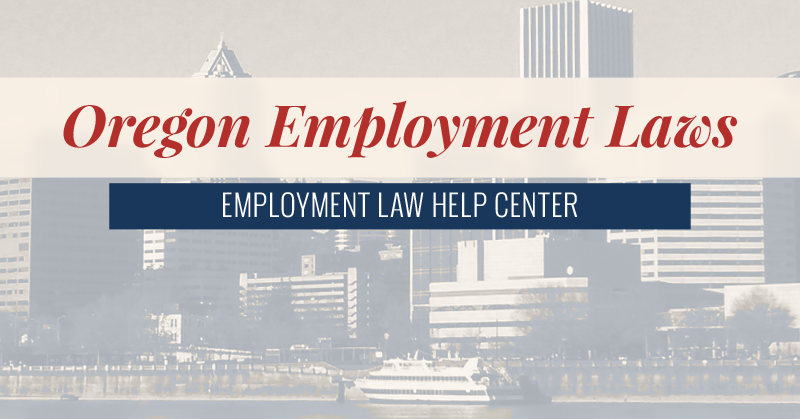Oregon Employment Law
Employment law is a broad area of the law that sets the basic standards for nearly every aspect of the employee/employer relationship, including minimum wage regulations and premium rates for overtime work, and also protects employees from unlawful employment practices, like workplace discrimination, harassment, retaliation and wrongful termination. If you have been paid at a rate below the Oregon minimum wage requirement, or if you have been the victim of employment discrimination or wrongful termination, contact a knowledgeable Oregon employment law attorney today to discuss the possibility of filing a lawsuit against your employer.

Wage and Hour Laws
While many states follow the federal Fair Labor Standards Act (FLSA) in regards to wage and hour issues in the workplace, there are also state laws in Oregon that provide further protections for employees, governing their right to a minimum hourly wage and predetermined meal and rest breaks, among other wage and hour concerns. For example, the current federal minimum wage requirement is only $7.25, but Oregon has set the state minimum hourly wage rate at $9.75, which means employers in Oregon are required to pay nonexempt regular and “tipped” employees at least $9.75 per hour.
Unpaid Wages and Overtime
Oregon wage and hour laws also set strict deadlines for the payment of regular and overtime wages to employees, including the payment of final wages in instances where the company goes out of business, or the employee quits or is fired. The state of Oregon also has laws in place that require employers to pay a premium wage to employees who work overtime, at a rate of one-and-one-half-times their regular rate of pay for every hour worked over 40. Under Oregon law, employees who are owed back pay or final wages by their employer may have grounds to file an Oregon unpaid wages claim to pursue financial compensation for their losses.
Workplace Discrimination
There are state and federal anti-discrimination laws in place that prohibit employers in Oregon from discriminating against employees or job applicants on the basis of a protected characteristic, such as age, race, color, religion, sex or national origin. Workplace discrimination may also take the form of an employer sexually harassing an employee, or taking negative employment action against an employee for exercising his rights, by opposing discriminatory practices, reporting discrimination in the workplace, or taking part in a discrimination investigation.
Wrongful Termination
A type of employment discrimination, wrongful termination occurs when an employer fires an employee for reasons that are considered unlawful or illegal. For example, it is against the law for an employer to fire an employee because of his or her membership in a protected class, in violation of an employment contract that promises job security, or on the basis of a protected activity, such as filing a workers’ compensation claim, reporting illegal activity on the employer’s part, or taking time off work for jury duty.
COBRA Continuation Coverage
Under federal COBRA laws, workers in Oregon with group health plans and certain members of their family may have the right to extend their healthcare coverage for a limited period of time, in certain circumstances where they would otherwise lose their benefits. These so-called “qualifying events” include job loss, reduced work hours, death of the covered employee, and divorce or legal separation from the covered employee, among other events. Federal COBRA laws only apply to employers with 20 or more employees, but the state of Oregon provides similar healthcare continuation coverage provisions for employees who work for businesses with between two and 19 employees.
SSI/SSDI Disability Benefits
Individuals in Oregon who are unable to work because of a physical or mental disability may qualify for financial assistance from the federal Supplemental Security Income (SSI) or Social Security Disability Insurance (SSDI) programs. While SSDI benefits are only available to “insured” individuals who worked long enough before becoming disabled and paid Social Security taxes during that time, the SSI program is based on financial need, and pays monthly benefits to aged, blind and disabled individuals with little income and resources, to cover the cost of basic needs like food, clothing and shelter.
To learn more about Federal US employment laws, browse the following topics:





